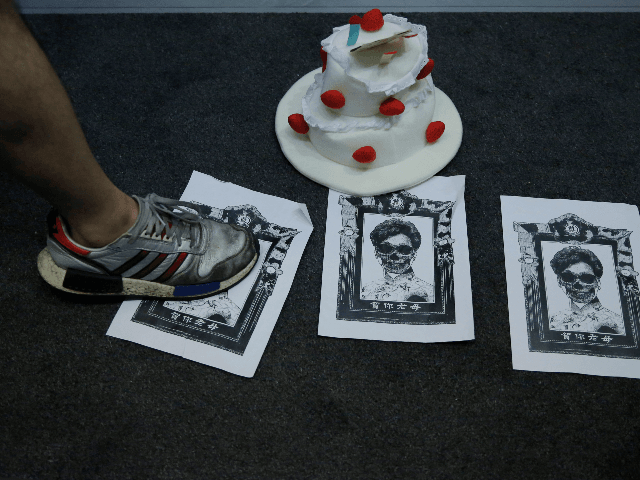Pro-democracy protesters in Hong Kong took to several shopping malls on Wednesday for protest events marking the birthday of Chief Executive Carrie Lam, complete with a fake birthday cake and celebratory singing modified to “happy birthday, fuck you.”
The Hong Kong Free Press (HKFP) identified seven locations that attracted protesters that day, four of them malls in the New Territories, outside of the city center. Protesters on Hong Kong Island, the heart of the city, also chose one mall, Cityplaza, as well as the city’s Times Square.
The birthday cake formed part of the protest in Langham Plaza mall, Mong Kok, where crowds also appeared to flood a mall to sing their version of “Happy Birthday” to the head of their government. Protesters also waved the black flag that has become symbolic of their movement and includes the slogan, “Liberate Hong Kong Revolution of Our Times.” They also sang protest songs such as “Glory to Hong Kong,” which has become the unofficial anthem of the movement. Some protesters marked the “birthday” celebration with traditional funeral papers, signaling the end of the pro-China regime.
Hong Kong officials deployed riot police throughout the city to subdue the protesters. Undercover officers also infiltrated some events, resulting in violence. In New Town Plaza, a mall in New Territories, an undercover officer suddenly began attacking a small group of peaceful protesters – and, notably, journalists – with pepper spray. It is not clear why the officer attacked; police claimed in a statement that the officer acted against an alleged “rioter.” Radio Free Asia (RFA) noted of the incident that, unlike images out of the Mong Kok protest, those in New Town Plaza attempted to respect the social distancing rules in effect in the city to prevent the spread of the Chinese coronavirus. Hong Kong has largely reopened its businesses but banned groups of more than eight people from gathering in public.
RTHK, a Hong Kong broadcast network, stated that the violence occurred around 8:30 p.m. local time. The outlet also added more detail on the affair, stating that the officer first attacked a man with an umbrella – umbrellas are a symbol of the protest movement – and then “turned around and sprayed a journalist who had been filming the scene.” The HKFP reported that police appeared to detain four people as a result of the incident.
The Hong Kong pro-democracy protest movement has resurfaced with energy following months of anti-coronavirus lockdown measures preventing public gatherings. Protesters began to take the streets once more following the lifting of health restrictions at the beginning of the month, making the same demands that launched the movement last summer: direct election of lawmakers, an independent investigation into police brutality, freedom for political prisoners, and an end to authorities referring to peaceful protests as “riots.” It did not take long after the resumption of the protests for the Chinese Communist Party to refer to the protesters themselves as a “virus” that “must be eliminated.”
Last week, hundreds of protesters organized throughout the city for Mother’s Day themed protests, attracting violent attacks by riot police. Hong Kong authorities reported over 200 arrests on Sunday of protesters ranging in age from 12 to 65 years old. Police claimed the arrests and violent acts against protesters and journalists were necessary as some were not abiding my social distancing provisions.
In addition to the core demands of the movement, protesters are also organizing against a proposed law that would criminalize disrespect towards the “March of the Volunteers,” the national anthem of Communist China. The bill, modeled after Communist Party law on the other side of the border with China, would allow for prison sentences of up to three years for anyone who does not properly revere the anthem, including its commercial use or potentially poorly sung versions of it.
After a tumultuous takeover of the Legislative Council (LegCo), pro-China lawmakers have placed the bill at the top of the docket for the next legislative session, beginning on May 27. Carrie Lam’s government has expressed a desire to see the bill pass “as soon as possible.” The legislative session begins shortly before the anniversary of the Tiananmen Square massacre in 1989, the observance of which launched the protest movement in June 2019.
At the time, protesters also objected to another proposed law which would have allowed the Communist Party government to extradite anyone present in Hong Kong if accused of violating Chinese laws. The protesters argued that the law would make Chinese laws applicable on Hong Kong soil, a violation of the Basic Law, the founding governing template of the city. After months of protests, Lam’s government formally withdrew the bill.

COMMENTS
Please let us know if you're having issues with commenting.